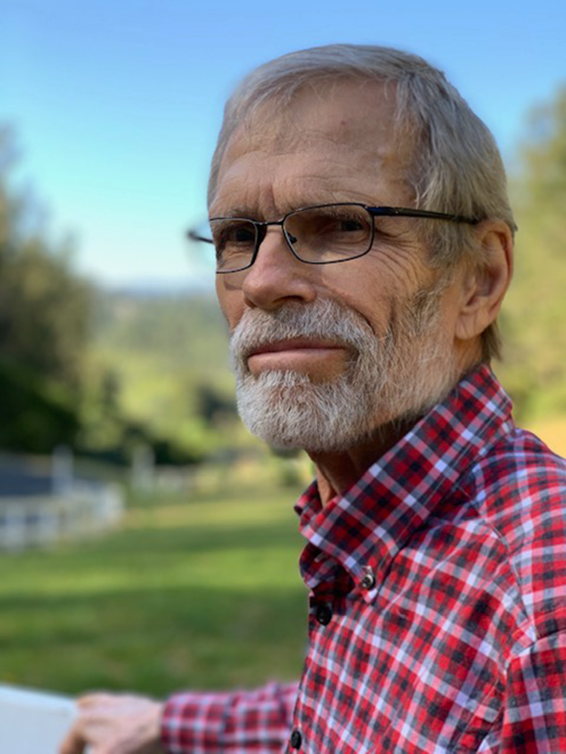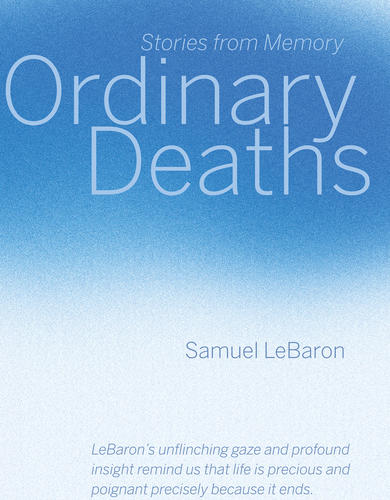
One of Dr. Samuel LeBaron's favourite places is his garden
Oct. 10, 2022

Ordinary Deaths it is not.
Extraordinary . . . that’s more apt, or so writes Abraham Verghese, author of Cutting for Stone, on the back flap of Dr. Samuel LeBaron’s new collection of old memories.
A UCalgary medical school grad and professor emeritus at Stanford University, the new book by LeBaron, PhD, MD’89, is an introspective look at death and loss. Writing the book was a 15-year process made all the more poignant by the fact that LeBaron is, himself, dying. Two and a half years ago, LeBaron was diagnosed with stage-4 lung cancer, which forced him to pivot from consoling those who were dying to feeling the cold breath of mortality on his own neck.
From little-boy memories of a childhood spent on ranches in southern Alberta, to decades spent counselling dying children and their families (LeBaron’s PhD is in clinical psychology from Michigan State University), to returning to school at UCalgary (in his 40s) to study medicine, LeBaron did not actually set out to write this recently published book.
About 15 years ago, he thought he’d compile a series of letters for his children that recounted his life. He worked with two editors who helped him reconstruct his experiences that explore death in all its messiness, rather than explain it using tidy reductive theories. The result is that LeBaron’s ability to hold space for the uncertainty, mystery and doubts we have about dying is anything but ordinary.

One of Dr. Samuel LeBaron's favourite places is his garden
From his home near San Francisco, Calif., we chatted with LeBaron about Ordinary Deaths: Stories From Memory.
What prompted you to return to Canada to study medicine when you were enjoying a successful career as a clinical psychologist in the States . . . obviously complicated by the fact you had two teenagers in tow?
It did seem like a wildly impractical notion. But it was after meeting the dean of the school where I worked at that time who said, “If you're compelled by a voice, you better pay attention,” that I decided to follow his advice. That said, I had wrestled with the idea for a long time.
In both professions you deal with death and dying. How are the approaches different and/or similar?
Of course, clinical psychology occurs on a more behavioural and emotional level, whereas medicine has a foundation that goes deeper into biological problems, whether it’s an infection or some other kind of illness or pain.
On the other hand, it’s really astounding how much of medicine is really based on emotional, social and familial patterns and behaviour. Whether it’s the way people eat or the degree to which they exercise, it’s about how they manage their lives. Moving from clinical psychology into clinical medicine is more continuous than one may expect. Of course, that was in large part because I went into primary care where it really is based very heavily on emotional, behavioural and personal issues.
Why did the field of death and dying interest you?
There’s a chapter in the book that deals with me as four-year-old when I had a broken leg. There was no pain medication for kids back then as the common medical belief was that children who were suffering pain had immediate amnesia for it . . . a bizarre belief, but there it was. That experience of intense pain wound up being very profound for me which contributed to the career path that I eventually took.
What did you learn about the writing process?
It was a lot of hard work. Being in academia, I had published a lot of academic papers and so I thought I can do this. The original project began as a collection of stories and memories that I thought I would leave for my kids so I could say, “There, there’s the answer. That’s what I was doing all this time.” But, when I began sharing rough drafts, people convinced me I should submit it as a manuscript. Once the University of Alberta Press committed to it and asked me to work with an editor . . . then the work really began. That was about two years ago.
Was it painful?
At times, yes. It was extremely challenging. But the hard work paid off, so now I am very happy about it.
Do you have any advice for people who may have flirted with the idea of writing some sort of memoir?
Definitely. Just do it! And do it with total disregard for whether it will be published or not. There are so many opportunities for us to self-publish or to work with a publishing firm that will print 50 copies of whatever it is you produce . . . ultimately, it is such a gift to your family. Tell one story at a time.
Many of us lack the vocabulary to talk about death and worry we will sound like a cliché. What should people say or do that will give someone comfort?
You’re right. If writing, “Our thoughts and prayers are with you,” feels like an overused cliché, that’s because it is. Say something else. Say . . . “We love you. It was so wonderful being with you yesterday,” or, “We’re looking forward to coming to see you tomorrow.” Whether it’s through a card or in-person, you are reaching out because that individual is important to you. Just say that . . . “You are so important to me, and, to us, you’ve always been an inspiration and we’ve always loved your smile.”
Why do we struggle for a language that seems to desert us when it comes to death or pain or suffering?
I believe we are so predisposed towards trying to fix things. And if we can’t fix a person who’s dying, well, there’s kind of an inclination to fix the moment. Can we somehow fix this moment and make it better? And the answer is probably yes, but it’s not always by saying something. It’s often just by the fact that you show up. Words can be such a burden, unless they are asked for.
What gives you comfort these days?
Poetry — I often read Rilke — music, and our garden gives me joy. Probably more than anything else, children give me joy. We have children in our extended family who range in ages from about six months on up to 10 years . . . I love it when they come to our home with their laughter, and just play around.
Ordinary Deaths: Stories From Memory is available from University of Alberta Press.